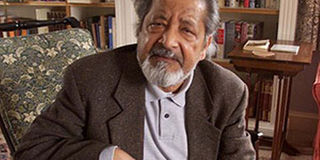VS Naipaul the enigma

Understandably, literary types were elated when British-Trinidadian writer V. S. Naipaul visited Uganda in 2008. After all, he has a Nobel Prize for Literature (2001) and no less an authority than The Times of Britain ranked him seventh on its list of “The 50 greatest British writers since 1945” in 2008. They fawned over him, the literary types, referring to him by his earned title ‘Sir’ (he always claimed that he would never accept a knighthood; when he accepted it he said he’d never use the title), and read intently into his decision to come to Uganda for his residency in 1966. There was really no special reason, Naipaul told an inquirer at a dialogue held at Makerere University, deflecting a hallful of hope.
The word flawed-genius exists because there are a good number of flawed geniuses. Naipaul is a paragon of that elite club. Since of his numerous works I’ve read only one book, Miguel Street, I’ll defer to the opinion of Slate Magazine’s Johann Hari: “Yes, the prose of this British-Trinidadian writer deservedly won him the Nobel Prize, but his work is weirdly split. In his fiction, he has a gorgeous, almost preternatural empathy for the humiliated, the shamed, and the downtrodden. Yet in his nonfiction, he is often staggeringly cruel and dismissive about the people he meets on his travels, writing off whole countries as barbaric and even pining for a touch of imperial aggression against them.”
He’s quite an enigma, and he knows it too well. “A writer is in the end not his books, but his myth. And that myth is in the keeping of others,” Naipaul has written before. His myth has been expounded by two different biographers, one of whom he befriended at Makerere, and it’s an ugly one: he’s a racist, misogynistic, arrogant, petulant and mean.
During his stay in Uganda, he frequently mentioned to whoever would care to listen that, “Africans need to be kicked – that’s the only thing they understand.” To get an African to do anything you’d have to “whip them” and when shortlisted for the Nobel prize in 1998: “Of course I won’t get it – they’ll give it to some nigger or other.” It’s not only Africans he sees as inferior. Once, he said that 40 years ago Indians were not intellectual enough to read his writing (he’s of Indian descent by the way). He dismissed the talents and powers of other writers and intellectuals as weaker when compared to his, a rather diverse list: James Joyce, Charles Dickens, E M Forster, W. Somerset Maugham, John Maynard Keynes, Jane Austen, Anthony Powell and Derek Walcott.
On his visit here, his wife was fiercely protective of him and with good reason. Although he was here for a writing assignment, specifically to research for The Masque of Africa, a nonfiction book released in 2010, Naipaul has aged and mellowed and is probably incapable of the cruelty he inflicted on his first wife. He openly cheated on her, visiting prostitutes and keeping a mistress he sometimes violently beat. He married his current wife two months after the death of his first one, legitimising an affair he had carried on as she was dying from breast cancer.
Naipaul’s physical decline has however, and fortunately, had little bearing on his mental acuity. Like Hari beautifully acknowledges above, this acuity is a regrettable mixture of gorgeous genius and a selfish, shallow cruelty and dismissiveness. In an interview at the Royal Geographical Society on 31st May, he said that there’s no woman who can match his literal prowess. Apparently, he’ll “read a piece of writing and within a paragraph or two I know whether it is by a woman or not. I think (it is) unequal to me.” This is because of their “‘sentimentality, the narrow view of the world. And inevitably for a woman, she is not a complete master of a house, so that comes over in her writing too.”
He was careful to mention that he didn’t “mean this in any unkind way.” He particularly singled out Jane Austen, probably because Pride and Prejudice critically and leisurely trumps anything he’s written, saying he “couldn’t possibly share her sentimental ambitions, her sentimental sense of the world”.
Obviously, since we are dealing with Naipaul, this isn’t shocking. Someone who has the audacity to dismiss Keynes, Joyce, Walcott and Forster won’t have any compunction while downplaying an entire sex of writers. Still, despite his boorishness and hubris, I wonder if he’s read anything by Doris Lessing, Arundhati Roy, Toni Cade Bambara, Zadie Smith, Toni Morrison or Willa Cather. Yet, why should I care? The best way to deal with grumpy old Naipaul is to read his work, hopefully, and ignore what comes out of his mouth. Like Diana Athill, another excellent female writer, says, his claims are “laughable” and, as usual, he’s making a monkey of himself.




